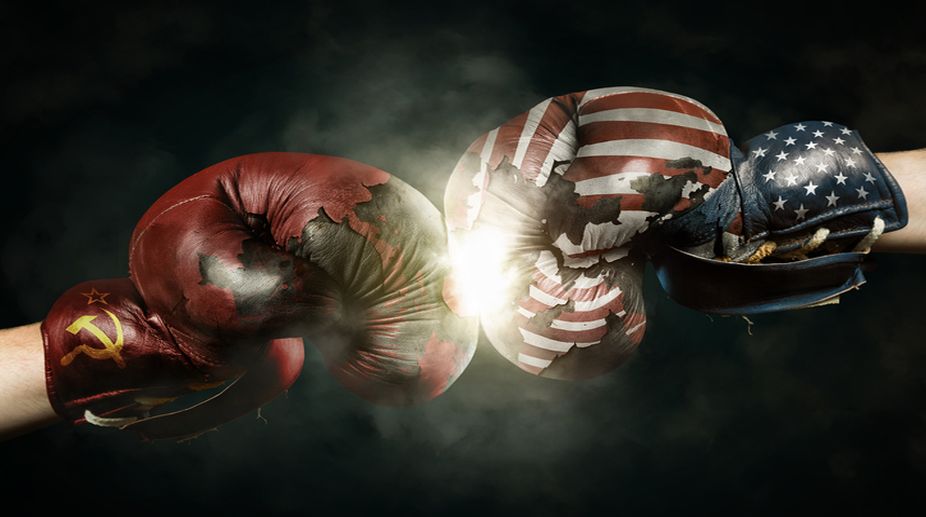It is the clear verdict of history that the Cold War between the Allies and the former Soviet Union, that was to last half a century after the Second World War, was a direct result of British and American generals repeatedly ignoring civilian directions at the concluding stages of the war. The Allied military leadership, while marching into Germany opened a broad front for the liberation of Berlin, ignoring warnings that Stalin was making a straight dash for the Capital city. The civilian leadership could rightly anticipate that if the latter were to reach there first, Berlin would be a divided city.
In retrospect, the civilian strategy proved to be wiser. For half a century, the two nuclear blocs ~ NATO and the Soviets ~ were locked in an ‘eyeball to eyeball’ confrontation in Berlin, putting the whole world under the threat of a nuclear holocaust. And it was a similar story of warped military thinking that landed many of the East European nations into the iron grip of the former Soviet Union through their local Communist parties ~ agents of the Soviet Communist party. The most tragic case was that of Poland.
Overrun by the Nazis, Poland was fighting with its back to the wall. The Polish Resistance was fighting the occupying Germans in alliance with the local communist party, waiting for the promised help from the Soviet Army. The Red army did march all the way from Russia but halted abruptly at the gates of Warsaw. The Allied military leadership was supplying arms to the Polish Resistance to fight the Nazis, in close alliance with the local communists, who betrayed them to the Nazis when the moment arrived.
The British civilian leadership had cautioned their military not to encourage the Polish resistance to trust their communist allies, who were merely acting as proxies for Moscow. The tragic scenario unfolded precisely as the Allied civilian leadership had anticipated. The Polish communists betrayed the Polish Resistance ~ behind their back ~ to the occupying Nazis who butchered them mercilessly. It has been described as the most pernicious act of perfidy in the Second World War. Only after the butchery was complete, did the Red Army enter, with Polish communists ~ who did not fight ~ riding piggyback.
Soon after Second World War, the most serious conflict was the Korean War. The Allied forces were led by the US General, Douglas MacArthur, the hero of many a battle during the earlier war. Undoubtedly, he was a great military commander but a poor political strategist. The North Koreans had invaded South Korea, with the support of the Chinese communists. MacArthur wanted to cross the river boundary between Korea and China, and take the fight right into China.
By which time, China had come under Communist rule led by Mao Zedong. He was a ruthless dictator who was prepared to sacrifice a few lakh Chinese soldiers, for a “cause”. His army had just one gun for three soldiers, so that if the gun-carrying soldier was to be killed, his weapon would be passed on to the next soldier. For this reason, he had developed the ‘human wave’ tactics. MacArthur completely misread him, convinced that the Chinese would not intervene, their army being ill-prepared and under-armed. For his poor military judgment, he was dismissed from service.
The world was on the brink of a nuclear holocaust in 1962, over US-USSR confrontation over Cuba, a Soviet satellite. The former Soviet Union had clandestinely smuggled offensive nuclear missiles there, posing a nuclear threat to the USA. The Americans imposed a blockade of Cuba, preventing any ship from either entering or leaving. At the time, both the USA and the USSR were super powers, heavily armed with nuclear weapons. The USA had imposed very tough conditions on the USSR. A blockade, by itself was a somewhat humiliating ban on the then other major power.
President Kennedy was the US P resident, who, incidentally, was himself a former Naval officer with experience of war. The US military advised him to maintain the blockade which could possibly have led to a nuclear exchange, and the whole world could have been faced with a catastrophe. The civilian advice to him was wiser ~ a quarantine, which would permit the Soviet ships access to Cuba but after inspection by the US Navy so that no offensive cargo was being ferried.
The US move was complied with by the Soviets, and proved to be a face-saver for the other super power. Shockingly, the then US Air Chief in an unprecedented show of utter defiance of civlian authority made his intention open ~ his bombers would start bombing Cuba within the hour. It was an unprecedented act of open defiance of civilian authority that could have resulted in a nuclear war with the Soviets. The threat was issued after President Kennedy had publicly declared cessation of the dispute with the Soviets. The Air Chief had to be almost physically prevented from doing so.
Modern psychologists tell us that a man acts according to his experience and training. A soldier who has been taught the art of war and trained to fight all his life to win, and win decisively by annihilating the “enemy” cannot suddenly turn a peacenick. For him, there is only one glory ~ to be recognised for ‘victory’ in battle. To be denied this, for whatever reason is to question his very existence and being.
In sum, the question of a Defence Supremo is closely linked to the question of primacy of the civil or military viewpoint not only during peacetime but even during war. The issue assumes critical importance in the age of nuclear weapons when the nuclear powers, both declared and undeclared have a combined destructive capacity of a million Hiroshimas. History is replete with instances of disasters whenever the military viewpoint has prevailed even during war.
Galbraith, the top civilian adviser to President Kennedy during the Cuban crisis, was a witness to the US military functioning during the last time almost the entire humanity stood on the edge of a precipice ~ “In the US, as in other democracies, it is thought wise and even necessary that the military power be kept subordinate to civilian authority and restraint … in nearly all recent Pentagon confrontations when faced with the strongly conditioned attitude of the military, civilians have surrendered thereto.”
(Concluded)
The writer is a retired IAS officer.











